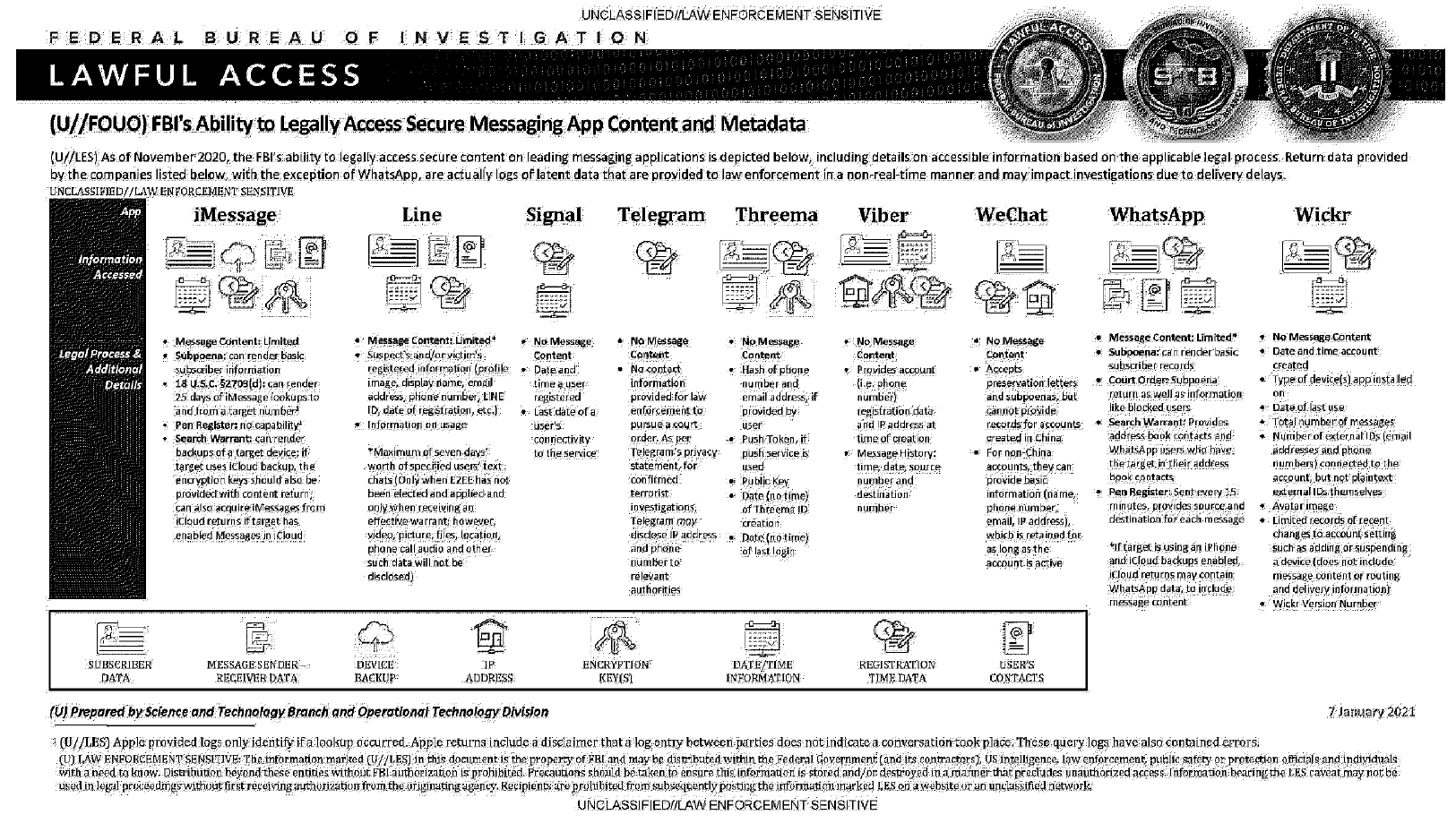FBI Doc Highlights the Benefits of End-to-End Encryption
A document from the Federal Bureau of Investigation reveals the data the Bureau can (and can’t) access from messaging applications, including iMessage, Signal, Telegram, Wickr, WhatsApp, and others.
Property of the People obtained the document through a FOIA request in November 2021. The FBI’s Science and Technology Branch and Operational Technology Division created the document in January 2021. The document, which serves as an internal guide for Bureau employees, outlines the information available to the FBI during an investigation. The document lists iMessage, Line, Signal, Telegram, Threema, Viber, WeChat, WhatsApp, and Wickr. The document validates the information already known to people interested in private messaging services.
The information is not groundbreaking but it is impossible to read without zooming in.
The picture is difficult to read. The PDF version (here) is slightly easier.
The FBI is able to access a significant amount of subscriber information for users of WhatsApp and iMessage, as expected. Likewise, Signal and Telegram seem to provide the least information to law enforcement agencies. The document illustrates information already known, such as the limits of end-to-end encryption. Such encryption prevents those who glow from accessing the contents of a message but not the metadata, such as subject lines, recipients, etc. Metadata is potentially as valuable to law enforcement as the actual contents of a message. From Signal, the FBI can only access a user’s registration date and last access date. Wickr, on the other hand, yields the following information:
- Date and time account created.
- Type of device(s) app installed on.
- Date of last use.
- The number of messages.
- The number of external IDs (email addresses and phone numbers) connected to the account, bot not to plaintext external IDs themselves.
- Avatar image.
- Limited records of recent changes to account settings such as adding or suspending a device (does not include message content or routing and delivery information).
- Wickr version number.
Wickr, though, is closely linked to In-Q-Tel as well as other parties associated with the intelligence community. Signal, although a clear winner for the general population and a current darling of the media, will become less friendly to users who want to separate themselves from an oppressive regime. As reported in April, Signal is working on cryptocurrency integration using MobileCoin. MobileCoin’s CTO is Moxie Marlinspike, the creator of Signal. And MobileCoin wants the government all up in your transactions. “At MobileCoin, we believe governments have a legitimate interest in regulating the economic lives of their citizens,” the MobileCoin website openly states. To quote someone who comments on this site, “should have used Monero.” (DIFBR)
People who use WhatsApp or iMessage for sensitive conversations are not serious people. The same, obviously, is true for people who SMS or most popular messaging services for the same purpose. The graphic speaks for itself. But since the graphic is difficult to read, Catalin Cimpanu (who is someone worth following) reformatted the content in a legible way:
Apple iMessage
- Message content limited.
- Subpoena: can render basic subscriber information.
- 18 USC §2703(d): can render 25 days of iMessage lookups and from a target number.
- Pen Register: no capability.
- Search Warrant: can render backups of a target device; if target uses iCloud backup, the encryption keys should also be provided with content return can also acquire iMessages from iCloud returns if target has enabled Messages in iCloud.
Line
- Message content limited.
- Suspect’s and/or victim’s registered information (profile image, display name, email address, phone number, LINE ID, date of registration, etc.)
- Information on usage.
- Maximum of seven days worth of specified users’ text chats (Only when E2EE has not been elected and applied and only when receiving an effective warrant; however, video, picture, files, location, phone call audio and other such data will not be disclosed).
Signal
- No message content.
- Date and time a user registered.
- Last date of a user’s connectivity to the service.
Telegram
- No message content.
- No contact information provided for law enforcement to pursue a court order. As per Telegram’s privacy statement, for confirmed terrorist investigations, Telegram may disclose IP and phone number to relevant authorities.
Threema
- No message content.
- Hash of phone number and email address, if provided by user.
- Push Token, if push service is used.
- Public Key
- Date (no time) of Threema ID creation.
- Date (no time) of last login.
Viber
- No message content.
- Provides account (i.e. phone number)) registration data and IP address at time of creation.
- Message history: time, date, source number, and destination number.
- No message content.
- Accepts account preservation letters and subpoenas, but cannot provide records for accounts created in China.
- For non-China accounts, they can provide basic information (name, phone number, email, IP address), which is retained for as long as the account is active.
- Message content limited.
- Subpoena: can render basic subscriber records.
- Court order: Subpoena return as well as information like blocked users.
- Search warrant: Provides address book contacts and WhatsApp users who have the target in their address book contacts.
- Pen register: Sent every 15 minutes, provides source and destination for each message.
- If target is using an iPhone and iCloud backups enabled, iCloud returns may contain WhatsApp data, to include message content.
Wickr
- No message content.
- Date and time account created.
- Type of device(s) app installed on.
- Date of last use.
- Number of messages.
- Number of external IDs (email addresses and phone numbers) connected to the account, bot not to plaintext external IDs themselves.
- Avatar image.
- Limited records of recent changes to account setting such as adding or suspending a device (does not include message content or routing and delivery information).
- Wickr version number.